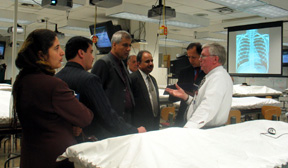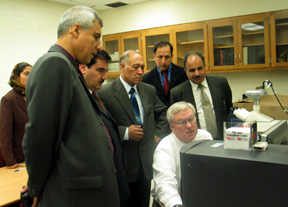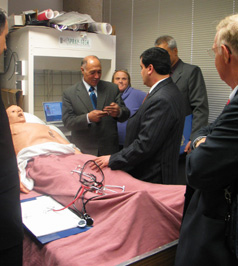 |
Gordon Todd, M.D., far right, shows six health care professionals from Kabul UNMC’s gross anatomy lab. |
Today, the medical center is helping administrators at Kabul Medical University revamp their dated educational program.
Six health care professionals from the university in Afghanistan are spending a week with UNMC faculty members to get a first-hand look at medical care and student education.
“Their entire curriculum is like when I went through medical school,” said Ward Chambers, M.D., a 1973 UNMC alumnus who has led the faculty development program between UNMC and Kabul Medical University.
“Their focus has been on delivering health care,” said Dr. Chambers, an associate professor of cardiology and executive director of Community and Multicultural Affairs at UNMC. “Now they want to focus more on medical education and make their curriculum more interactive.”
On Thursday, their first day on campus, the group visited the gross anatomy and histology lab, saw the College of Nursing’s patient simulator, visited the hospital’s Biocontainment Unit and the cell analysis facility in the Durham Research Center, and learned about Information Technology Services’ online course management system.
 |
Gordon Todd, M.D., shows several histology slides on the computer. |
“We want to visit each section or department at the Nebraska University and implement what we see,” said Dr. Obaidullah Obaid, chancellor of Kabul Medical University.
Dr. Obaid was joined by Dr. Chiragh Ali, director of surgery; Dr. Baray Siddiqui, director of anatomy and director of educational affairs; Dr. Kabir Ahmad Faiz, director of pediatrics; Dr. Zubaida Anwari Zhwak, director of OB/GYN; and Bashir Noormal, director of human resources for the Afghan Ministry of Health.
Their visit to UNMC is part of an ongoing relationship with Kabul Medical University. The relationship started nearly three years ago when Dr. Chambers began a faculty development program in the country. The partnership evolved out of the University of Nebraska at Omaha’s long-standing educational relationship with the country under Tom Gouttierre, dean of International Studies and Programs at UNMC and UNO.
 |
Visitors see how the College of Nursing’s patient simulator works. |
Dr. Chambers said another trip to Kabul is planned in the near future to do intensive curriculum training with several Kabul faculty members, who in turn will train colleagues. One of the biggest challenges in updating the curriculum, Dr. Chambers said, is finding the necessary resources.
While in Omaha, the group will participate in integrated clinical experience (ICE) and problem-based learning (PBL) sessions at UNMC, meet with faculty and staff, and tour the Shenandoah (Iowa) Memorial Hospital.